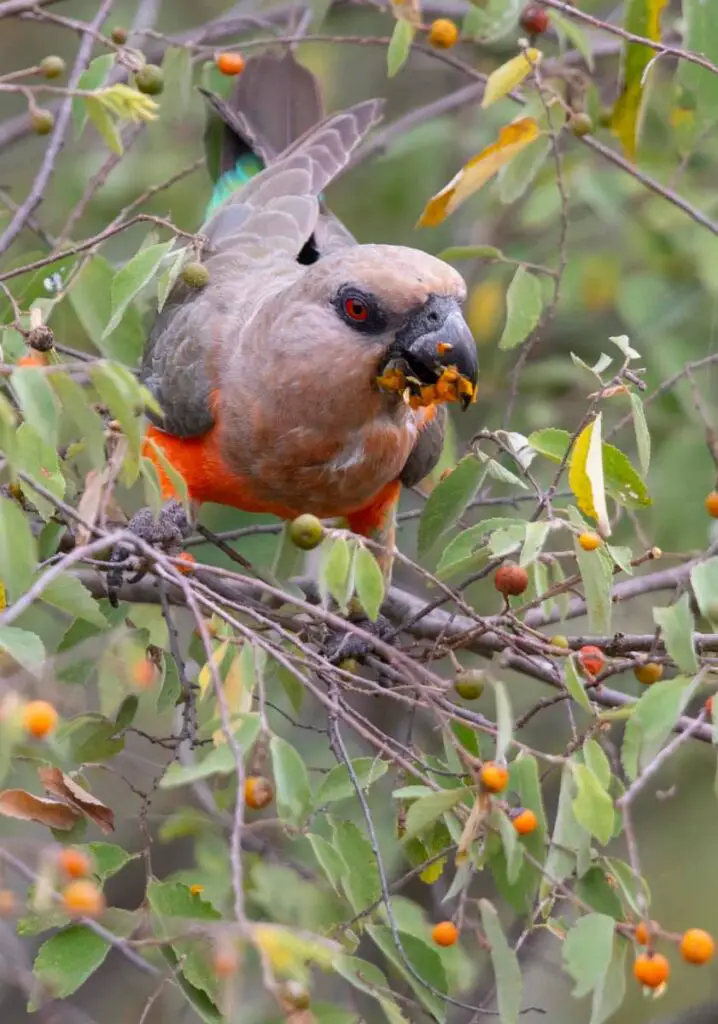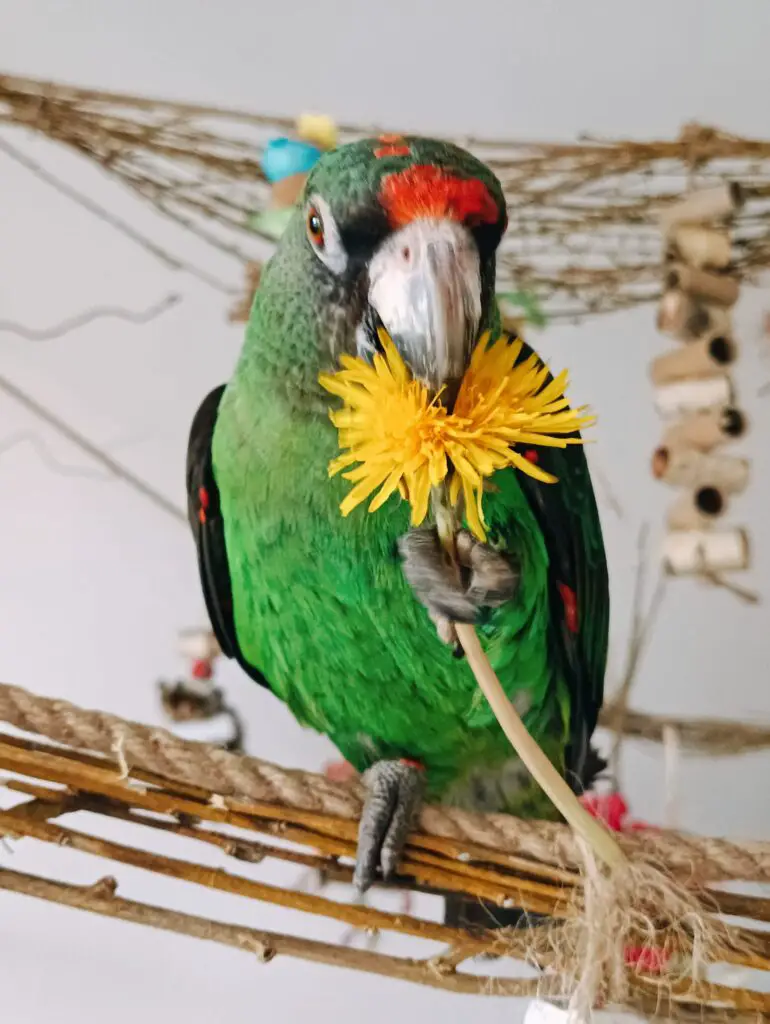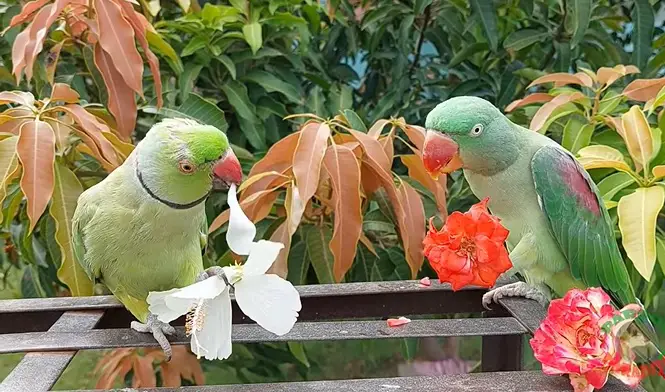Can parrots eat flowers?
Parrots are popular pets all over the world, known for their intelligence and ability to mimic human speech. These beautiful birds have unique dietary needs that require proper care and attention. Many parrot owners often wonder if their pets can eat flowers, whether as a treat or as part of their regular diet. Yes, parrots can eat flowers but not all types of flowers are safe for parrots.
In this article, we will explore whether parrots can safely consume flowers, what types of flowers are safe for them to eat, and the potential risks associated with feeding flowers to parrots.
Understanding Parrot Diets
Parrots are omnivorous birds, which means that they can consume a wide range of foods, including fruits, vegetables, nuts, and seeds. In the wild, parrots feed on a variety of foods depending on their species, habitat, and season. Domesticated parrots, on the other hand, have specific dietary needs that require proper balance and nutrition to maintain their health and well-being.

A healthy parrot diet should consist of:
- Fresh fruits and vegetables
- High-quality pellets
- Limited nuts and seeds
It is essential to provide a varied diet that meets your parrot’s nutritional needs to avoid health problems such as obesity, malnutrition, and vitamin deficiencies.
Benefits and Risks of Feeding Flowers to Parrots
Flowers can be a healthy addition to your parrot’s diet as they are rich in vitamins and minerals. Some flowers also have medicinal properties that can help treat certain health conditions in parrots. However, feeding flowers to parrots can also pose some risks.
The benefits of feeding flowers to parrots
- Providing natural antioxidants that boost immunity
- Offering natural sources of vitamins
- Helping with digestion
- Providing mental stimulation
The risks of feeding flowers to parrots include
- Flower toxicity, which can cause illness or death
- Allergic reactions in some parrots
- Nutritional imbalance if not fed in moderation

Safe Flowers for Parrots
There are many types of flowers that parrots can safely eat. Some of the safe flowers for parrots include:
- Roses
- Banana Flowers
- Marigolds
- Daisies
- Sunflowers
- Zinnias
- Hibiscus
- Calendula
- Pansies
- Nasturtiums
These flowers are not only safe for parrots to eat, but they also provide nutritional benefits and add variety to their diet. For example, banana flowers have a good amount of Calcium (56 mg per 100g) and phosphorus (56 mg per 100g) with a 1:1.5 ratio.
Neutritional value of banana flower per 100 gm raw
| Energy | 51kcal |
| Protein | 1.6g |
| Fat | 0.6g |
| Carbohydrate | 9.9g |
| Fibre | 5.7g |
| Calcium | 56mg |
| Phosphorous | 73.3mg |
| Iron | 56.4mg |
| Copper | 13mg |
| Potassium | 553.3mg |
| Magnesium | 48.7mg |
| Vitamin E | 1.07mg |
However, it is crucial to introduce flowers gradually and in small amounts to avoid any digestive issues.
Unsafe Flowers for Parrots
While some flowers are safe for parrots to eat, others are highly toxic and can cause severe health problems. It is essential to avoid feeding the following flowers to your parrot:
- Daffodils
- Hyacinths
- Lilies
- Tulips
- Azaleas
- Oleander
- Iris
- Foxgloves
- These flowers contain toxic substances that can cause vomiting, diarrhea, seizures, and even death in parrots.
How to Introduce Flowers to Your Parrot
If you decide to introduce flowers to your parrot’s diet, it is crucial to do it gradually and in moderation. Start with a small amount and observe your parrot’s reaction. If your parrot shows signs of an allergic reaction or digestive issues, stop feeding flowers immediately.
It is also important to wash flowers thoroughly to remove any chemicals, dirt, or pesticides that may be harmful to your parrot. You can also offer flowers in a variety of ways, such as fresh, dried, or mixed in with their regular food.
Signs of Flower Toxicity in Parrots
If you suspect that your parrot has consumed toxic flowers, it is essential to seek veterinary care immediately. Some common signs of flower toxicity in parrots include:
- Vomiting or diarrhea
- Loss of appetite
- Lethargy or weakness
- Difficulty breathing
- Seizures
- Collapse or coma
- Early intervention is critical to ensuring your parrot’s survival.
Conclusion
In conclusion, parrots can safely eat certain types of flowers, but it is essential to know which flowers are safe and which ones are toxic. Providing a balanced and varied diet is crucial for your parrot’s health and well-being. If you decide to feed your parrot flowers, introduce them gradually and in moderation, and monitor your parrot for any adverse reactions. Remember that flower toxicity can cause severe health problems in parrots, and seeking veterinary care immediately is critical to their survival.
FAQs
Can all types of flowers be toxic to parrots?
Not all types of flowers are toxic to parrots, but some can be highly toxic and cause severe health problems.
Can parrots eat all types of fruits and vegetables?
Parrots can eat most types of fruits and vegetables, but some may be toxic or harmful to them. It is essential to research which fruits and vegetables are safe for your parrot.
Is it okay to feed parrots nuts and seeds regularly?
Nuts and seeds should be given to parrots in moderation as they are high in fat and can lead to obesity and other health problems.
Can parrots eat flowers as a replacement for their regular food?
No, flowers should not be a replacement for your parrot’s regular food. They should be offered as a treat or in moderation as part of a balanced diet.
What should I do if my parrot shows signs of flower toxicity?
If you suspect that your parrot has consumed toxic flowers, seek veterinary care immediately. Early intervention is critical to ensuring your parrot’s survival.
Related bird safe fresh food posts-
